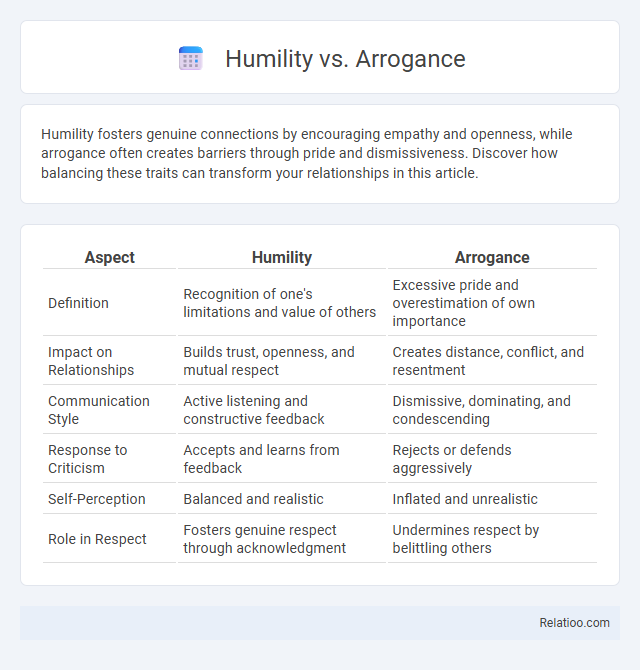Humility fosters genuine connections by encouraging empathy and openness, while arrogance often creates barriers through pride and dismissiveness. Discover how balancing these traits can transform your relationships in this article.
Table of Comparison
| Aspect | Humility | Arrogance |
|---|---|---|
| Definition | Recognition of one's limitations and value of others | Excessive pride and overestimation of own importance |
| Impact on Relationships | Builds trust, openness, and mutual respect | Creates distance, conflict, and resentment |
| Communication Style | Active listening and constructive feedback | Dismissive, dominating, and condescending |
| Response to Criticism | Accepts and learns from feedback | Rejects or defends aggressively |
| Self-Perception | Balanced and realistic | Inflated and unrealistic |
| Role in Respect | Fosters genuine respect through acknowledgment | Undermines respect by belittling others |
Defining Humility and Arrogance
Humility is characterized by a realistic self-assessment, openness to new ideas, and recognition of others' contributions, promoting personal growth and strong relationships. Arrogance involves an inflated sense of self-importance, dismissive attitudes towards others, and resistance to feedback, which can hinder collaboration and trust. Understanding these traits helps you cultivate humility for better social and professional interactions.
Psychological Foundations of Humility
Humility is grounded in accurate self-assessment, openness to feedback, and an appreciation for others' contributions, contrasting sharply with arrogance, which is marked by an inflated self-view and resistance to criticism. Psychological research identifies humility as a core virtue that fosters emotional intelligence, empathy, and social connectedness, essential for healthy interpersonal relationships and personal growth. Unlike arrogance, humility enhances psychological well-being by reducing defensiveness and promoting a balanced self-concept.
Roots and Causes of Arrogance
Arrogance often stems from deep-rooted insecurities and an overcompensation for perceived weaknesses, contrasting sharply with genuine humility, which arises from self-awareness and acceptance. Your awareness of these underlying causes can help dismantle arrogance by fostering empathy, vulnerability, and openness. Understanding the psychological and social triggers behind arrogant behavior enables personal growth and healthier interpersonal relationships.
Humility in Personal Growth
Humility is a vital trait in personal growth, fostering self-awareness and openness to feedback, which are essential for continuous improvement. Unlike arrogance, which hinders learning by promoting a fixed mindset, humility allows individuals to recognize their limitations and embrace challenges constructively. Cultivating humility enhances emotional intelligence and interpersonal relationships, leading to more authentic and sustained personal development.
The Detrimental Effects of Arrogance
Arrogance undermines Your relationships by fostering distrust and alienation due to an inflated sense of self-importance. Unlike humility, which encourages open-mindedness and personal growth, arrogance leads to poor decision-making and conflicts by dismissing others' perspectives. The detrimental effects of arrogance extend to professional environments, resulting in decreased collaboration, lower morale, and stunted innovation.
Social Perceptions: Humble vs Arrogant
Humble individuals are often perceived as approachable, trustworthy, and open to feedback, fostering positive social interactions and collaboration. In contrast, arrogance tends to evoke perceptions of superiority, insensitivity, and defensiveness, which can hinder relationship building and create social barriers. Social psychology studies highlight that humility promotes empathy and social cohesion, while arrogance frequently results in social isolation and conflict.
Leadership: The Power of Humility
Effective leadership thrives on humility, which fosters trust, openness, and collaboration within teams. Unlike arrogance that creates barriers and resists feedback, humility enhances emotional intelligence and encourages continuous learning. Leaders who practice humility inspire loyalty and drive sustainable success by valuing others' contributions and admitting their own limitations.
Consequences of Arrogance in Relationships
Arrogance in relationships often leads to communication breakdowns, as it fosters resentment and diminishes empathy between partners. This behavior can cause trust erosion, making it difficult for Your connections to thrive and for conflicts to be resolved constructively. Embracing humility instead promotes mutual respect, understanding, and stronger emotional bonds.
Cultivating Humility: Practical Strategies
Cultivating humility involves actively practicing self-awareness and embracing feedback to foster personal growth. Strategies include mindful reflection, recognizing one's limitations, and valuing others' perspectives to counter arrogance and promote empathetic interactions. Consistent application of these techniques enhances emotional intelligence and strengthens social bonds.
Choosing Humility in a Competitive World
Choosing humility in a competitive world fosters genuine connections and opens opportunities for growth, contrasting sharply with arrogance, which often alienates others and limits collaboration. Embracing humility enhances emotional intelligence, enabling individuals to learn from criticism and adapt more effectively in dynamic environments. Prioritizing humble leadership and teamwork drives sustainable success by cultivating trust and respect among peers and stakeholders.

Infographic: Humility vs Arrogance
 relatioo.com
relatioo.com